新标准第3册
- 格式:doc
- 大小:31.00 KB
- 文档页数:2
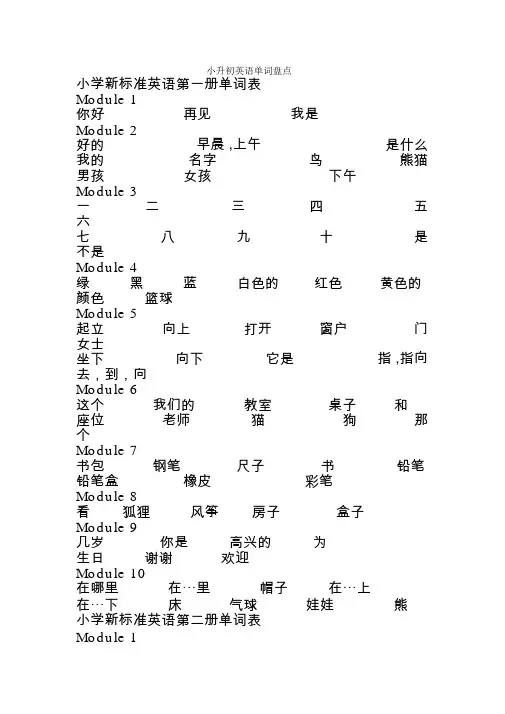
小升初英语单词盘点小学新标准英语第一册单词表Module 1再见我是你好Module 2早晨 ,上午好的是什么我的名字鸟熊猫男孩女孩下午Module 3一二三四五六七八九十是不是Module 4绿黑蓝白色的红色黄色的颜色篮球Module 5起立向上打开窗户门女士指 ,指向坐下向下它是去,到,向Module 6这个我们的教室桌子和座位老师猫狗那个Module 7书包钢笔尺子书铅笔铅笔盒橡皮彩笔Module 8看狐狸风筝房子盒子Module 9几岁你是高兴的为生日谢谢欢迎Module 10在哪里在⋯里帽子在⋯上在⋯下床气球娃娃熊小学新标准英语第二册单词表Module 1多少十一十二橙色知道其他的树如此许多的鸟让我们Module2父亲母亲爷爷,外公奶奶,外婆姐妹兄弟朋友医生学生他是她是Module3她的包他的外套他们的护士连衣裙司机公共汽车Module4头脸鼻子嘴巴耳朵眼睛这些腿Module5他们是奶牛农场猪鸡鸡蛋瘦的胖的幼崽小的大的粉红的Module6蛇长的动物园短的高的非常狮子可爱的可怕的Module7玩足球喜欢篮球乒乓球热的游泳去游泳跳舞疲劳的Module8用一起特别喜爱的运动关于Module9肉面条米饭糖果孩子们冰激凌Module10这是礼物对不起的小汽车小学新标准英语第三册单词表Module 1歌曲拼图自行车玩具Module2T 恤衫妈妈爸爸太小的衬衫在聚会衣服裤子鞋Module3我们有英语新来的数学音乐请演奏体育课科学汉语,语文美术Module4点钟电影时间跑火车饥饿的正餐,主餐现在好吧太好了Module5起床上学吃午餐回家然后上床睡觉半小时晚于迟的吃早餐Module6看电视周末读来和⋯⋯一起好听Module7]城市公园也想要我们(宾格)居住Module8怎样,如何乘坐步行上班度假船中国飞机爱Module9春天穿夹克冬天夏天秋天毛线衫暖和的凉爽的寒冷的Module10新年吃头发圣诞节英国唱小学新标准英语第四册单词表Module 1像,如同晴朗的天气,气候有风的下雨快,走吧在这里下雪Module2收音机照片报纸照相机微笑画图画写信把⋯⋯涂颜色Module3整理,收拾房间做家庭作业秘密卡片花今天Module4噪音喝,饮谈话在那里游戏Module5跳绳游戏时间伤心的没有人我(宾格)隐藏寻找赶快抓Module6通常星期天帮助它(宾格)东西生病的他(宾格)她(宾格)烧菜去购物Module7儿童节剧一些念,背诵诗班级舞龙野餐(风筝)睡Module8向上小山车站向下经过医院停止看见转向朝着相反方向触摸,接触Module9直着走向右向左湖西路对不起,打扰湖东路工厂Module10在⋯⋯旁边在⋯⋯的前面堂兄超市详细地,熟悉地当然小学新标准英语第五册单词表Module 1使用筷子困难的人们刀叉容易的汉堡包薯条快餐Module2制作蛋糕主意代替可爱的Module3淘气的龙舟划船湖喂离开湿的短裤Module4能胜利者跳远看出,发觉Module5商店生病的饼干担心全部的Module6电子游戏机小心的修理拼图玩具宠物老鼠Module7头疼胃痛考试星期五聪明的感冒咳嗽Module8石头动物大象马参观男人女人Module9运动日跳高跳远赛跑参加赛跑火车司机出租车司机公交车司机Module10香港飞机场大海星期六小学新标准英语第六册单词表Module 1友善的总是但是有一点害羞的安静的吵闹的有帮助的加上二十更多的Module2宽的古老的伦敦来自河流钟高的新的圆的Module3也许老虎很多打电话Module4作家将来警察Module5水果苹果橘子桃子十四他们(宾格)十三十五十六十七十八十九Module6工作,学习努力地说话相当地擅长表达,写道努力,尝试很快地Module7谁祖父母老的年轻的在那时漂亮的亲爱的昨天有趣的Module8第二楼层找到第一蔬菜上一个牛奶Module9明天带着为什么天,日子星期一在⋯⋯之后星期二星期三星期四Module10五十三十不同的六十四十八十九十七十百小学新标准英语第七册单词表Module 14 月不久告诉仍舞蹈也美国人Module2昨天打扫完成洗脏的Module3学习国庆节Module4发明纸重要的印刷术印刷自行车Module5去长城看见吃享受买爬山穿滑冰摔倒受伤学习滑冰摔倒Module6食物拿走制金子作生气的只离开说Module7弄坏哭怪物跑Module8来刚过去的赢得金制的奖杯练习赢得Module9发生放骑口渴的西瓜从⋯⋯跌落膝盖切,割手指Module10麻烦事药牙疼发烧小学新标准英语第八册单词表Module 1机器先生土豆眼镜任何东西等待鸭子草地安静Module2困难的选择昂贵的完美的便宜的价值为千Module3呼喊狼从前照看绵羊无聊的村庄每个人田地,牧场笑谎话,谎言到⋯⋯里Module4中国的激光唱盘音乐会紧张的在⋯⋯之前结束鼓掌自豪的什么时候Module5发生 母亲节 出乎意料的消息,祝词特殊的Module6粘贴极好的见报导面,集合 Module7太空 sun 太阳 planet 行星 ring 环,环形物 moon 月亮夜晚banana 香蕉at all 根本Module8country 国家America 美 国东方west 西方cousin 堂兄弟north 北方south 南方首都Canada 加拿大Module9because 因为map 地图language 语言澳大利亚后面的leaves 树叶(复数)Module10寄明信片祖父餐馆许多的,非常小学新标准英语第九册单词表Module1以前鸭子操场年Module2重的提,抬卖 出价国家有时饭馆Module 3夜晚为什么Module 4请柬回复Module 5我的你(们)的她的他的(两者)都谁的短裙笑Module 6好的真实的分队36Module 7盲的特别的听见火在⋯⋯里面安全的Module 8(复)早操想排列念休息学习Module 9无聊的没什么水Module l0应该规则友善的小学新标准英语第十册单词表Module1( drive 的过去式)驾驶笛子演奏者办公室父亲;母亲Module2电子邮件香肠三明治美味的Module3归还借入,借来Module4(send的过去式 )寄(身体)很好收到,接到巧克力糖季节Module5损坏的,折断的提,背,抱背部肩膀;肩部棕色的;褐色手Module6地方圆,圆圈建造解答,解释(think 的过去式 )希望令人惊讶的Module7发出咔嗒声 ; 点击信息另一个忙碌的Module8( draw 的过去式)画当然张、片、块纸剪刀(复数)Module9剧院问题在于(man的复数形式)男人( woman的复数形式)女人房间历史Module10票牙刷建筑物小学新标准英语第十一册单词表离开,动身(一年级起点)Module1一千,一千个百万,百万个公里地方,地点可能,可以建筑物,大楼Module2惊奇各处,到处饭馆不同的舞蹈周末Module3collect 收集America 美邮票album集邮册国coconut 椰子加拿大Module4hear 听到,听见nearly 几乎,特殊的,特别的接近,差不多礼物together 一起Module5高兴的,满足的地址笔友漂亮的外国的Module6(复)筷子困难的城市回答完成,结束Module7电脑光盘竹子模仿Module8整理,收拾常常,经常选择星期,周孩子书架醒的Module9和平世界袋鼠Module10口渴的拿来,带来方式,方法排,列小学新标准英语第十二册单词表Module1女服务生可乐美元热狗美分享受,欣赏Module2在⋯⋯周围鸭子不久,快干的顽皮的,淘气的Module3有趣的,好笑的很快地湿的生气的,愤怒的发光Module4(用手、肩等)提,搬超市聚会拿着落下,跌落稍后,随后在远处,到远处(常复)楼梯重的Module5鼓掌到达Module6太空旅行感兴趣的宇宙飞船模型Module7度过激动的,兴奋的录像自豪的将来某一天Module8瞎的聋的Module9麻烦事棒球队错误恐惧的Module10中学真正地学习地理有用的学生。
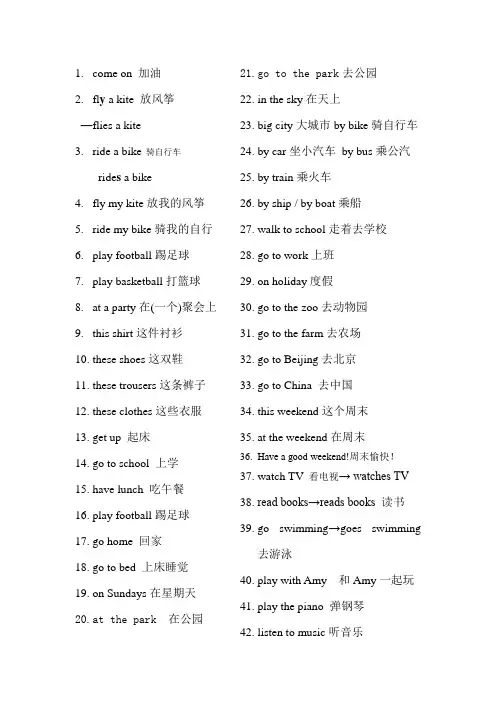
e on 加油2.fl y a kite 放风筝—flies a kite3.ride a bike骑自行车ride s a bike4.fly my kite放我的风筝5.ride my bike骑我的自行6.play football踢足球7.play basketball打篮球8.at a party在(一个)聚会上9.this shirt这件衬衫10.these shoes这双鞋11.these trousers这条裤子12.these clothes这些衣服13.get up 起床14.go to school 上学15.have lunch 吃午餐16.play football踢足球17.go home 回家18.go to bed 上床睡觉19.on Sundays在星期天20.at the park 在公园21.go to the park去公园22.in the sky在天上23.big city大城市by bike骑自行车24.by car坐小汽车by bus乘公汽25.by train乘火车26.by ship / by boat乘船27.walk to school走着去学校28.go to work上班29.on holiday度假30.go to the zoo去动物园31.go to the farm去农场32.go to Beijing去北京33.go to China 去中国34.this weekend这个周末35.at the weekend在周末36.Have a good weekend!周末愉快!37.watch TV看电视→ watches TV38.read books→reads books读书39.go swimming→goes swimming去游泳40.play with Amy 和Amy一起玩41.play the piano 弹钢琴42.listen to music听音乐43.listen to CDs 听光盘.44.play the drums敲鼓45.It’s spring. 现在是春天。
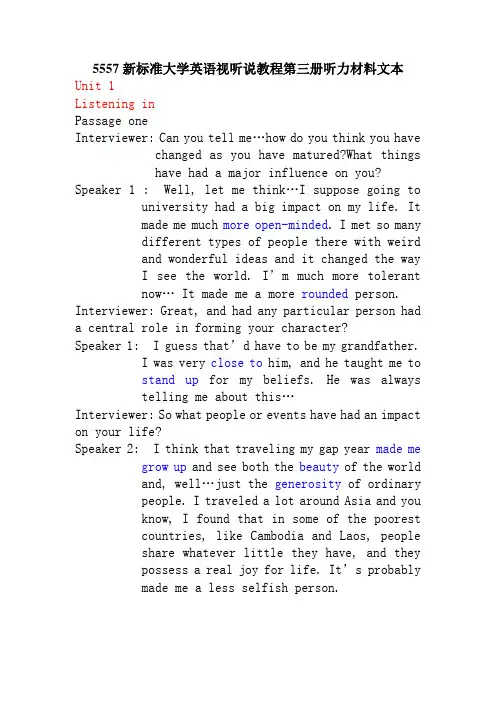
5557新标准大学英语视听说教程第三册听力材料文本Unit 1Listening inPassage oneInterviewer: Can you tell me…how do you think you have changed as you have matured?What thingshave had a major influence on you? Speaker 1 : Well, let me think…I suppose going to university had a big impact on my life. Itmade me much more open-minded. I met so manydifferent types of people there with weirdand wonderful ideas and it changed the wayI see the world. I’m much more tolerantnow… It made me a more rounded person. Interviewer: Great, and had any particular person had a central role in forming your character?Speaker 1: I guess that’d have to be my grandfather.I was very close to him, and he taught me tostand up for my beliefs. He was alwaystelling me about this…Interviewer: So what people or events have had an impact on your life?Speaker 2: I think that traveling my gap year made me grow up and see both the beauty of the worldand, well…just the generosity of ordinarypeople. I traveled a lot around Asia and youknow, I found that in some of the poorestcountries, like Cambodia and Laos, peopleshare whatever little they have, and theypossess a real joy for life. It’s probablymade me a less selfish person.Interviewer: Interesting…so you would recommend that young people take a gap year to discoverthemselves and the world?Speaker 2: Definitely. It gives you an opportunity to learn about the world beyond the one you grewup in and I found it really…Interviewer: Could you tell me what things in your life have had the greatest influence informing your personality?○Sp eaker 3: Well…a couple of years ago I was on a reality TV show where a group of young people alllived in a house together. Each week some onewas voted off by the audience. I got down tothe final three! I suppose being on the showand seeing how the other contestants behavedmade me realize how selfish and spiteful somepeople can be just to get what they want. Ialso realized it’s best to just be yourselfin life. If you pretend to be someonedifferent people will eventually see throughthe lies.Interviewer: Right…And how did you feel when you were eventually voted off?Speaker 3: Relieved, to be honest with you. But you know, a slight regret that I didn’t winbecause I kind of…Interviewer: So you can tell me, what one thing do you think that has had the biggest impact on yourlife?Speaker 4: Hmm, that’s a difficult question. But I think helping victims of the tsunami in 2004had a very great impact on me. I’m half Thaiand I’d just arrived in Thailand for afamily Christmas holiday. When I heard the news I knew Ihad to help-you couldn’t not. I ended up acting as an interpreter for a group of volunteer doctors.It was an incredibly difficult time but youknow, even in the middle of such a horrifictragedy there is still a huge amount ofgenuine human kindness.Interviewer: That’s amazing! And has it changed the way you view your future…Passage twoTony: Talking to us today in our Life Choices series is Joan Robinson, an academic counselor atManchester University. She gives advice to schoolstudents on choosing the right subject to studyat university. Joan, welcome to the show.Joan: Thanks Tony.Tony: So Joan, what do our listeners need to think about when choosing a course? It’s a huge, potentiallylife-changing decision, isn’t it?Joan: Yes. I generally give students advice in two areas.Firstly, know yourself, and secondly, think to thefuture.Tony: When you say “know yourself” what do you mean? Joan: Basically, I mean evaluate your own personal strengths and weaknesses, your personality traits(特质) and the things you like.Tony: I see…So how can our listeners do this?Joan: Well, start by asking yourself questions to help reflect on your life so far. For example, whatsubjects are you good at? Are you an organized andself-disciplined person? Are you confident andoutgoing? Do you like working with others in a teamor do you prefer working alone? These kinds ofquestions will help you discover more about yourself.Tony: Sounds like good advice. How about your second point regarding the future?Joan: Well, your choice of major subject is likely to have a significant impact on your future careerso it’s important to look into this carefully.I recommend you check not only which academicsubjects will help you get into a particular area of work, but also look carefully at whatuniversities offer. Each university has itsstrengths so try to choose one that is the best in your chosen field. Find out what links thedepartment has to related industries and leading companies in it.Tony: Good point. Now I’d like to take some calls from our listeners. First up we have James on the line.Hi, James! How can we help?James: Hi. I’m interested in career in IT and I’d like to ask Joan whether she thi nks it’s better to go to a highly respected university, like Oxford, or to study somewhere that has more of a vocational focus?Joan: Well, James, you know it really depends on what you expect to get out of a university and how you see your future. Basically a handful of thebrightest graduates are picked from the topuniversities around the world to join the leading IT companies. So I’d say if you’re a high-flyer then this is the route that might be for you. But if you are looking for a more mainstream (主流)career then you should consider a course thathelps you acquire practical, transferable skills that you can use in the workplace…and look atwhich universities have the best levels ofgraduate recruitment for the kind of job you are aiming for.James: I see! Thanks a lot. That really helps me out…UNIT3Listening in conversation 1Lily: So what was the highlight of your trip to (South)Korea?Hugh: Well that's…let me see...it's got to be going to see Nanta.Lily: What on earth is Nanta?Hugh:It's this amazing live show-part theater-part dance-part music.Lily: Sounds really interesting. But why’s it so brilliant?Hugh: I think it's the energy of the performers. Also it has a unique concept. It's a mixture oftraditional Korean music, percussion and drums,into a western style performanceLily: I've never heard of it. Has it ever been performed in the West?Hugh: Yeah, it's been a sell-out. They've toured in over30 countries since the show began in 1997.It'sa non-verbal performance so there are no languagebarriers. That's what's made it an internationalsuccess.Lily: What else makes it so special then?Hugh: Well...the other thing is that all the action takes place in the kitchen. You see these fourchefs preparing the food for a wedding reception.The performers use knives, dustbin lids andvarious other kitchen utensils to create ahypnotic soundtrack. The food literally flieseverywhere! It's hilarious.Lily: That sounds quite funny I must admit. Is there an actual story though?Hugh: Oh yes, there is a story. The four chefs have to prepare the meal by 6 o'clock and they also haveto give the manager's nephew cooking lessons too,which adds to the fun. There’s loads of audienceparticipation and despite there being nolanguage involved you get completely engrossed.It's really quite wacky!Lily: And what about the audience? I suppose they start throwing food around…?Hugh: Not quite! But they are totally involved in what's going on-everyone loves it. It's a really greatfamily show. In fact it's one of the best showsI've ever seen. Jim, my friend, says he takes allhis visitors. He's seen it about eight times andstill loves it.Lily: I bet it's popular with tourists then.Hugh: Well apparently over a million foreign tourists in (South)Korea have seen the show and it's hada run on Broadway too. It first got popular afterthey appeared at the Edinburgh Festival. Now theyare planning to tour more cities in Asia where(South) Korean popular culture is becomingincredibly trendy.Lily: By the wa y what does“Nanta” mean?Hugh:It means random drumming in Korean. The English name for the show is Cookin’, which gives youa clearer idea of what it's all about.Lily: You've got me interested now. I'll have to check it out on the internet.Listening inConversation 2Interviewer: Kathy Richards is a specialist art tour guide. Kathy-can you tell us what trendsyou've noticed in recent years?Kathy: Well, one of the biggest phenomena I've noticed is a huge increase in visitors togalleries-and a growing interest in modernart in general.Interviewer: What do you think the reason is for that? Kathy: Well, there are several reasons, I think. The most important ones are firstly, that somenew contemporary art galleries have openedwhich have had a lot of publicity, andsecondly the younger generation feel morecomfortable with modern art so the kind ofpeople visiting galleries is changing.Finally, the new generation of gallerieshave become destinations inthemselves...they tend to be housed inamazing buildings.Interviewer: So which are the most popular new galleries?Kathy: Well, the Tate Modern in London has had over30 million visitors since it opened in2000.The annual average is now over 4.5million. The Museum of Modern Art, or MoMAin New York is an older gallery, it was founded in 1929 but has been recently renovated and expanded. This work was finished in 2006 and it had over 2.5 million visitors in the firstyear after reopening. Another verysuccessful new gallery is the Guggenheim inBilbao in Spain. It opened in 1997 and nowgets about a million visitors a year. Interviewer: Those are pretty impressive figures.Maybe the fact that the Tate Modern is freeto visit might have something to do with it? Kathy: It's true that entrance to the permanent collection is free but the numbers of peoplevisiting the temporary exhibition are alsohigh-and the entrance fee is usually aboutten pounds.Interviewer: Do you have to pay to get into the other galleries you mentioned?Kathy: Oh yes. You do. Admission to MoMA is 20 US dollars and the Guggenheim in Bilbao costseight euros.Interviewer: Do people mind paying, do you think? Kathy: No, I don't think they do mind. Most people feel the fees are reasonabl e considering theoutstanding collections of priceless worksof art that they get to see.Interviewer: You mentioned that the buildings that art galleries are in can be an attractionthemselves these days...Kathy: Well, yes, the Guggenheim has literally revitalized the whole city and put Bilbao onthe tourist map. It's got a futuristic, curvymetallic structure and people love it. TheTate Modern has helped redevelop an oldindustrial area beside the River Thames. Thegallery itself is actually inside a huge , old, brick power station.And MoMA is interesting as it's in downtown New York. Interviewer: And who visits these galleries? What's the profile of the average art lover?Kathy: Well, in the past museums and galleries were seen as appealing to the older generation.But in fact, 48 percent of visitors to theTate Modern are under 35...UNIT5Listening in 1Today we’ll focus on two aspects of group behaviour.Firstly,how groups develop,and secondly,the roles individuals play within a group.It’s widely acknowledged that the performance of effective groups is often greater than the sum of the individuals in the group.This is due to what we call synergy-in other words,the extra energy and effevtiveness that people create when they work together.Early research in this field carried out in the 1930s by Elton Mayo discovered something that he called the “Hawthorne effect”.The idea is that when individual know they are part of a study,their productivity automatically increases regardless of other factors,such as how much time or money they are given,for example.The research suggests that things like personal identity,s elf-esteem and the social context in which a group is working are really very important factors in improving the performance of individuals.If we move on to look at the nature of groups more closely,we find that groups have natural phasese that can help us understand their effectiveness.You have probably all had experience of working with other people in a group that,at firsl,wasn,t very productive.This phenomenon was studied by Tuckman in the 1960s,and he created a model to describe the stages of a group.The first stage is known as”Forming”which is when individual members get to know each other.This is followed by”Storming”when individual start to share their ideas and creative energy.The third phase is”Norming”where a group identity begins to form.The final stage is”Performing”when individuals within the group work together.And it is at this stage that the group achieves results.Understanding these phases can help us ensure that members of a group work together to overcome early loner.The”Resource investigator”is the group member who is always curious and explores new ideas and the”Monitorevaluator”is calm and serous and makes good,balanced decisions.The”Team worker”in c ontrast is a socially orientated and sensitive member of the team who is able to encourage a team spirit.And the”Comleter-finisher”is a conscientious perfectionist who follows through on the details and ties up and loose ends.To be effective,a team needs to have a variety of members who can fulfill all these different roles.Listening in 2Today I'm reporting from Phuket in Southern Thailand.Parts of the island were devastated by thetsunami in 2004,and over 250 people lost their lives here. I've come back to see how one community has recovered.Here in the village of The Chat Chai,the rebuilding of the destroyed homes has been led by the international organazition Habitat for Humanity.About a year after the tsunami occurred,volunteers began building 36 new homes for local families.One villager,Somwang,is certainly very happy with the results.He used to live in a small hut on his two square metre plot of land near the sea.The local community wanted him to have a bigger home and despite the small size of his plot of land,t hey built him a three-storey house,which is now the tallest in the village. A happy ending to such a horrific tragedy. The rebuilding here has also had a positive effect on the local economy,because the earth bricks that were used to build the homes were produced in Khao Lak,another tsunami hit island——all part of a post-tsunami livelihood development project.Talking to people here,I've discovered that the project not only provided them with much needed shelter,but also the process has helped rebuild a spirit of community amongst them.A host of foreign as well as local volunteers joined together to work in rebuilding the villagers' homes and lives,and even an American TV celebrity volunteered.The project has also been visited by former US president Jimmy Carter,who is an active supporter of Habitat for Humanity.He and his wife offer one week of their time every year to volunteer on construction projects around the world.It's certainly encouraging to see the strength of the human spirit and generosity of people who help others in times of need.Habitat for Humanity is continuing their work in the south of Thailand,helping poor local families and communities to improve their lives.Their "Save&Bulid" scheme encourages families to save 30 per cent of the cost of building or rebuilding their home.The charity then lends the family the rest of the money they need,and helps in the building of their new home.It's then paid for in monthly repayments of under $30,which supports those who want to build a better life for themselves.This is Marianne Harper reporting from Southern Thailand...Uint 9Listening inPart 1OK,so a littletest .Coca-Cola...Nike...ferrari.Think!What image did you get as I said these very famous brand names?Wait a moment.There’s no real need to answer,isthere,because we know,more or less,don’twe?Coca-Cola—that delicious fizzy drink,ice cold,on a summer’s day. Nike, running shoes forstrong,beautiful bodies.Ferrari—anattractive,powerful car for attractive,powerful people.The fact, the names, the brand names say it all.what’s in a brandname?Ideally,everything!Everything the manufacturer wants you to think of when you hear the name.that’s certainly what both customers’exeprience and researchtells us.it’s the reasons why manufa cturers attach such importance to choosing the right name for their products.Let’s have a look at some of the qualities a good brand name should have.Firstly ,it should be simple and easy to remember.Imagine if Coca-Cola had been namd “Cocafantaslicola”.I t’s just too long!Or,take other name—starbucks,the name of a famous coffee shop.now,that’s an easy name to remember,starbucks. Second point,the brand name should bedifferent,unique,something you can’t confuse with anything else.Like Coca-Cola.Or—let’s tak e another famous brand name—Microsoft.It combines two words,micro,meaning very small,and the word soft.Two words that together make a unique name—Microsoft. Thirdly,if the word is a real word,it should be strong,positive associations.Take the name Alfa Romeo,Alfa is the first letter of the Greek alphabet and has the association of the best or thestronges t.Romeo is the name of the most romantic lovers of all in a famous Shakespeare play.Alfa Romeo—strong,romantic.The words have great association,don’t the y?Forth point,the sound of the name is very important.take Ferrari.The word has a long vowel sound—“aaari”—that makes it sound luxurious.So Ferrari must be a luxurious car.How aboutCoca-Cola?It’s got a sharp,fizzy sound,just like the drink.So—all these things are what you should be looking for when choosing a brand name—somethingsimple,memorable,unique,with positive association and a great sound.whew!It’s not easy,is it,to choose a name that does all those things?But the very best brand names do exactly that.Part 2Interviewer: Clare, tell me about the names in your family. You say some of them have quite an interesting history.Clare: Yes, they do. Well, ok, I’ll begin with my own name. My maiden name was Habibis, but I’m married and my name’s Clare T hompson.Interviewer: Thompson.Clare: Yes. I don’t know much about the names or my husband’s side of the family, so I’ll talk about my own instead…OK, so…my full name’s Clare Elsie Thompson. “Elsie” is my middle name , which used to be a very old-fashioned name. in fact, it’s just come back into fashion-I met someone who called their baby ”Elsie”-but when I was younger it was the kind of name that made people laugh and I hated it.. Anyway, my parents wanted to name me after my grandmother, whose name was Elsie Clare, so their first idea was to call me Elsie Clare.Interviewer: Elsie Clare!Clare: Yes, but when they told my grandmother, she was horrified, and said, “you can’t do that to the child, I’ve had to put up with Elsie all my life, I don’t wa nt her to have to” . So they called me Clare Elsie instead.Interviewer: Sounds better!Clare: Yes…My father’s surname is Habibis . My mum’s English but he was Greek, so that was the name I grew up with. But Habibis isn’t a Greek name. It’s a Middle Easter n name and means “loved one” in Arabic. Interviewer: Really?Clare: Yes, and the reason for the surname, we discovered, is that my great-grandfather on my father’s side lived in Lebanon—there was a well-established Greek community there. And my great-grandfather was a very sociable, friendly kind of person and everyone liked him a lot so they gave him the name, “Habibi”,which means “loved one”Interviewer: Ah, that’s lovely!Clare: Yes, I do like that story. But my father had a great first name too. He was called Homer, after the Ancient Greek poet.Interviewer: The English would see that as a very unusual name, but I suppose the Greeks wouldn’t, would they?Clare: No, I don’t think so. But one of his brothers was called Mitton.Interviewer: Mitton , the 17th century English poe t? Clare: Yes. And you wouldn’t think that a Greek family would call their son after an English poet, would you? But they did!Unit 10Inside viewConversation 1Andy: So today, we're meant to be meeting a woman who does walking tours aroundmysterious London.Janet: What's that about?Joe: Aha! That's what we're going to find out. Apparently, she takes visitors round the mysterious sights of London. Anyway, ask her yourself!Janet: Why me?Andy: We were going to ask you, Janet, if you like to do the interview?Janet: Me? But I don't know anything about London! Andy: Which makes you a perfect person to ask some real questions.Janet: I don't believe it.Joe: And if you're any good, we'll upload your interview next week.Janet: I'm not sure what to say .It's great but are you absolutely sure you think I'm OK for this?Joe: Too late, here she comes. Hi, this is Janet……Janet: Emma, tell us about some of the legendary characters in London.Emma: Well, legendary characters might be complete myths or they may have actually existed. For example, most people believe that the famous detective Sherlock Holmes must have existed. But in fact, we know he can't have existed.Janet: And what about Guy Fawkes?Emma: Yes, Guy Fawkes did actually exist and he tried to blow up the Houses of Parliament. But we celebrate him every year on Guy Fawkes Night every 5th of November, and in fact, he's considered to be one of the most popular people in British history!Janet: And I've heard something about Dick Whittington and his cat?。
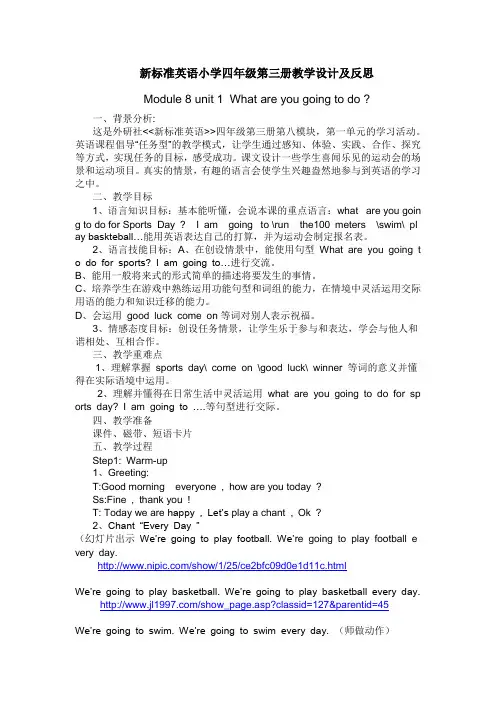
新标准英语小学四年级第三册教学设计及反思Module 8 unit 1 What are you going to do ?一、背景分析:这是外研社<<新标准英语>>四年级第三册第八模块,第一单元的学习活动。
英语课程倡导“任务型”的教学模式,让学生通过感知、体验、实践、合作、探究等方式,实现任务的目标,感受成功。
课文设计一些学生喜闻乐见的运动会的场景和运动项目。
真实的情景,有趣的语言会使学生兴趣盎然地参与到英语的学习之中。
二、教学目标1、语言知识目标:基本能听懂,会说本课的重点语言:what are you going to do for Sports Day ? I am going to \run the100 meters \swim\ pl ay baskteball…能用英语表达自己的打算,并为运动会制定报名表。
2、语言技能目标:A、在创设情景中,能使用句型What are you going t o do for sports? I am going to…进行交流。
B、能用一般将来式的形式简单的描述将要发生的事情。
C、培养学生在游戏中熟练运用功能句型和词组的能力,在情境中灵活运用交际用语的能力和知识迁移的能力。
D、会运用good luck come on等词对别人表示祝福。
3、情感态度目标:创设任务情景,让学生乐于参与和表达,学会与他人和谐相处、互相合作。
三、教学重难点1、理解掌握sports day\ come on \good luck\ winner 等词的意义并懂得在实际语境中运用。
2、理解并懂得在日常生活中灵活运用what are you going to do for sp orts day? I am go ing to ….等句型进行交际。
四、教学准备课件、磁带、短语卡片五、教学过程Step1: Warm-up1、Greeting:T:Good morning everyone , how are you today ?Ss:Fine , thank you !T: Today we are happy , Let’s play a chant , Ok ?2、Chant “Every Day ”(幻灯片出示We’re going to play football. We’re going to play football e very day./show/1/25/ce2bfc09d0e1d11c.htmlWe’re going to play basketball. We’re going to play basketball every day./show_page.asp?classid=127&parentid=45We’re going to swim. We’re going to swim every day. (师做动作)We’re going to play table tennis.We’re going to play table tennis every d ay. /show/1/25/a343cd837ca514b8.htmlWe’re going to run.We’re going to run every day. (师做动作)(先带领学生读两次,然后单独出示里面有关运动的词组的卡片,让学生读这些词组,并边读边做动作。
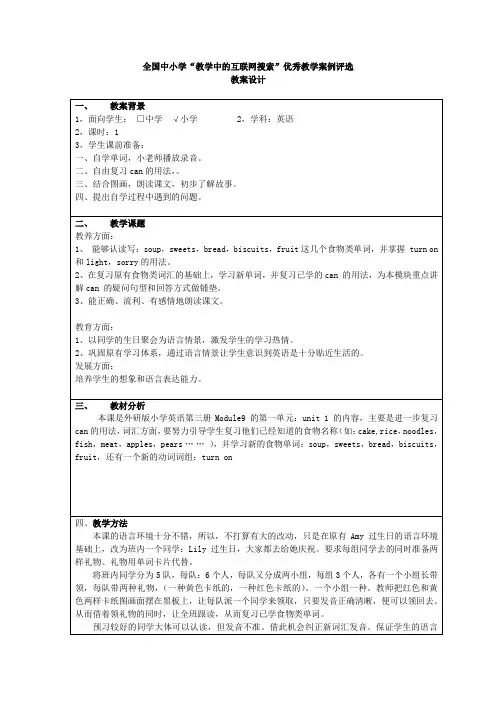
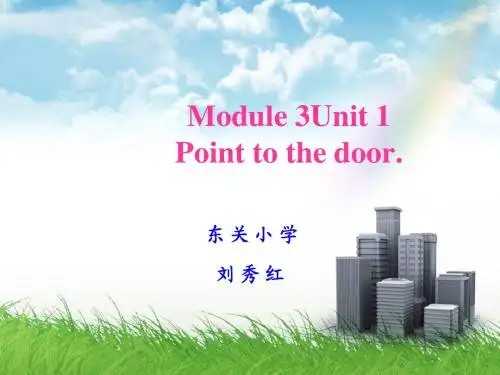
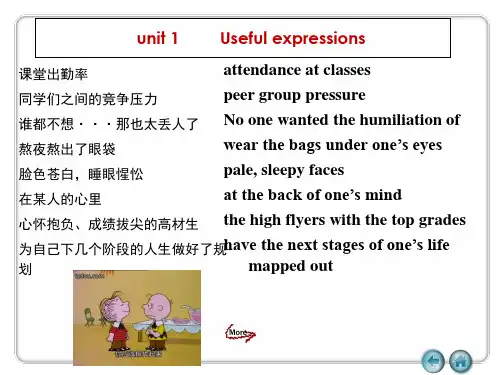
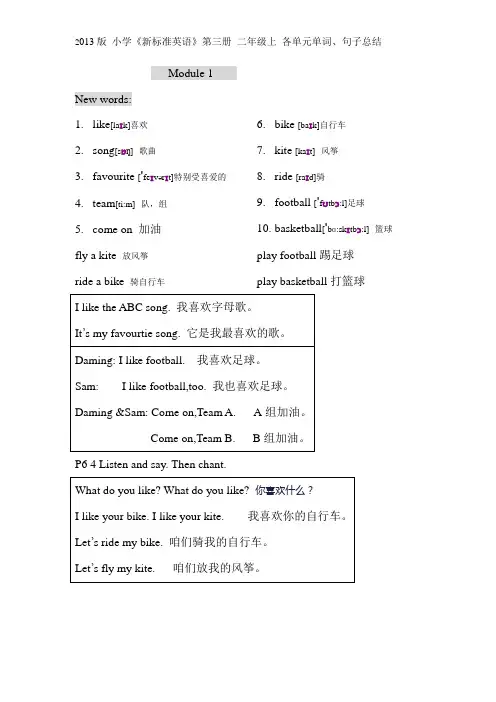
New words:1.like[laɪk]喜欢2.song[sɒŋ]歌曲3.favourite ['feɪvərɪt]特别受喜爱的4.team[ti:m]队,组e on 加油6.bike [baɪk]自行车7.kite [kaɪt]风筝8.ride [raɪd]骑9.football ['fʊtbɔ:l]足球10.basketball['bɑ:skɪtbɔ:l]篮球fly a kite 放风筝ride a bike 骑自行车play football踢足球play basketball打篮球P6 4 Listen and say. Then chant.1)meat [mi:t]肉2)noodles['nu:dlz]常复数)面条3)rice [r aɪs]米饭/大米4)sweets [swi:ts]糖果5)child[tʃaɪld] 孩子6)children ['t ʃɪldrən]孩子们7)ginger ['dʒɪndʒə(r)]姜8)onion ['ʌnjən](食物)洋葱9)mouth [m aʊθ]嘴10)ice cream [aɪs kri:m]冰淇淋11)apple ['æpl]苹果12)bat [bæt]球棒/蝙蝠13)car [kɑ:(r)]汽车14)duck [dʌk]鸭子15)dog [dɒɡ]狗16)bird[bɜ:d] 鸟17)cap [kæp] 帽子18)door [dɔ:(r)]门I like meat. 我喜欢肉。
I like meat, too.我也喜欢肉。
I like noodles.我喜欢面条。
I like noodles, too.我也喜欢面条。
Sam: Noodles for you, Tom. 汤姆,给你面条. Tom: No, no, no! I don’t like noodles. 不,我不喜欢面条.Amy: Rice?米饭?Tom: NO! I don’t like rice. 不,我不喜欢糙米饭.Sam: Meat. You like meat, Tom. 肉.汤姆,你喜欢肉. Tom: NO! I don’t like meat. 不!我不喜欢肉.Tom: I like sweets.I like sweets.我喜欢糖.Ms. Smart: Tom, sweets are for good boys. 汤姆,糖是给好孩子的. Are you a good boy? 你是好孩子吗? Tom: Ok .I like rice. I like meat. 好的.我喜欢米饭.我喜欢肉. Ms. Smart: You are good children. Sweets for you!Children: Thank you! Unit 2 I don ’t like ginger. P11 1 Listen and chant.P11 2 Listen and say.Lingling: Meat for you, Sam. 山姆给你肉。
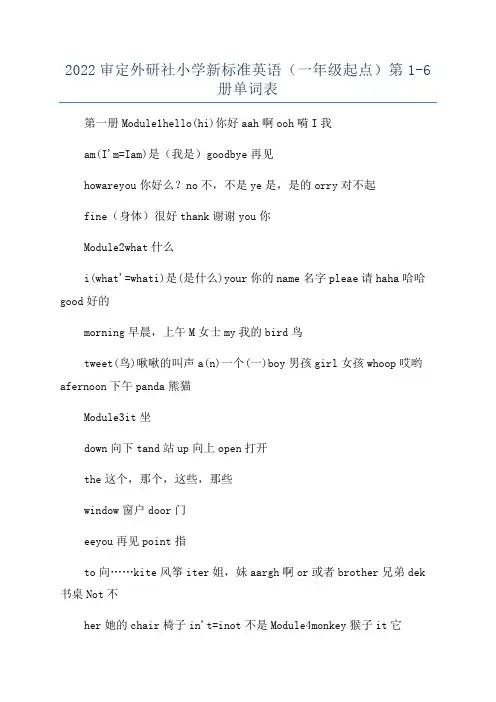
2022审定外研社小学新标准英语(一年级起点)第1-6册单词表第一册Module1hello(hi)你好aah啊ooh嗬I我am(I'm=Iam)是(我是)goodbye再见howareyou你好么?no不,不是ye是,是的orry对不起fine(身体)很好thank谢谢you你Module2what什么i(what'=whati)是(是什么)your你的name名字pleae请haha哈哈good好的morning早晨,上午M女士my我的bird鸟tweet(鸟)啾啾的叫声a(n)一个(一)boy男孩girl女孩whoop哎哟afernoon下午panda熊猫Module3it坐down向下tand站up向上open打开the这个,那个,这些,那些window窗户door门eeyou再见point指to向……kite风筝iter姐,妹aargh啊or或者brother兄弟dek 书桌Not不her她的chair椅子in't=inot不是Module4monkey猴子it它monter怪物iti=it'它是help救命(呼救用语)red红色houe房屋,住宅aha 啊哈bo某箱,盒blue蓝色wow呀,哇Module8yellow黄色howmany多少oh哦one一1colour颜色two二2green绿色three三3now现在four四4black黑色count数white白色ay说dog狗five五5cat猫i某六6and 和even七7hey嘿,喂eight八8look看nine九9orange橙色ten十10pink粉色,粉色的Module5ball球thi这个o这么,那么our我们的many许多teacher教师brown棕色棕色的chool学校claroom教室Module9Nicetomeetyou.见到你howold多大真高兴。
are是child小孩,儿童too也that那个happy快乐的bag包birthday生日but但是,可是Module6for为,给,对pen钢笔Module10pencil铅笔father父亲ruler直尺某daddy爸爸eraer橡皮monther母亲pencilcae铅笔盒grandpa祖父外公crayon蜡笔grandma祖母外婆friend朋友Module7hi他的new新的car汽车,轿车第二册Module1he(he’=hei)他(他是)doctor医生he(he’=hei)她(她是)me(宾格)我nure护士driver司机policeman警察pupil学生,小学生Module2where(where’=wherei)哪里(在哪里)in在……里on在……上hat帽子under在……下toy玩具bed床lookat看bear熊Module3eleven十一twelve十二don’t=donot不know知道other其他的fih鱼tree树let让我们Module4head头touch触摸noe鼻子face脸ear耳朵mouth嘴eye 眼睛body身体thee这些leg腿hand手feet(foot的复数形式)脚,足baby婴儿apairof一双…一对……hort(常复)短裤Module5hirt衬衫they他(她/它)们they’hoe鞋子re=theyare他(她/它)wim游泳们是OK行,好cow奶牛ock短袜pig猪puton穿上,戴上farm农场clothe(常复)衣服duck鸭子here这里chicken鸡football足球(运动)egg鸡蛋,蛋ping-pong乒乓球(运动)thin瘦very很,非常Module9fat胖的like喜欢big大的lion狮子little小的them(宾格)他/她/它们all全部,所有Module6play参加(体育运动或比nake蛇赛);玩耍hort矮的,短的with用……mall小的together一起elephant大象favorite最喜欢的;最喜go去爱的zoo动物园port运动long长的gue猜giraffe长颈鹿meatball肉丸子tall高的Whatbout…?怎么样?tiger老虎wimming游泳(运动)cute可爱的trong强壮的Module10hore马idea主意,想法aren’t=arenot不,不是hot热的gowimming去游泳Module7ing唱,唱歌therei有,存在dance跳舞animal动物tired累的,疲惫的can可以,能ee看见thereare有,存在help帮助overhere在那边table桌子we我们miaow(猫)喵喵叫ome一些at在Module82第三册lunch午餐Module1havelunch吃午餐ong歌曲home家litento...听……CD激光唱片rice米饭weet(常复)糖果children (child的复数)孩子们ginger姜nice好的mm呣onion洋葱icecrea 冰激凌Module3banana香蕉apple苹果milk牛奶orange柑橘,橙fruit 水果milkhake奶昔Hereyouare给你everything每件事,所有事物tomato番茄,西红柿really很,非常their他们的favorite最喜欢的事物Module4T-hirtT恤衫Here’=herei这是hm嗯,唔dre连衣裙too 太……one一个doen’t=doenot不trouer裤子party聚会Module5getup 起床poter海报,粘贴画gotochool去上学have吃,喝Module6drum鼓on在……的时候Sunday星期日Module9park公园winter冬天great太好了,好极了fly放飞(风筝)goal进球,得分in在…期间,在…时候hooray(表示激动与高兴pring春天的欢呼声),好哇ummer夏天live居住autumn秋天moon月亮kating滑冰ky天,天空gokating去滑冰city城市warm暖和的wear穿,戴Module7jacket夹克,短上衣How怎样,如何trainunglae太阳镜火车coat外套chug(发动机)发出咔cool凉爽的;酷的嚓声weater毛线衫bu公共汽车cold寒冷的beep(汽车喇叭)嘟嘟声walk步行Module10by乘,坐(交通工具)year年,年份Howabout………怎HappyNewYear!新年么样?快乐!跟;和Chinee中国的run跑,奔跑hair头发holiday假期firecracker鞭炮爆竹onholiday度假have有then然后Chritma圣诞节hip轮船wih祝,祝愿plane飞机dinner 正餐,主餐love喜爱Module8watche(watch的第三人称单数形式)观看weekend周末34第五册Module1ue使用choptick筷子want想要hungry饥饿的me肮脏,凌乱hard困难的knife刀fork叉aknifeandforkeay容易的hamburger汉堡包某chip薯条gra草food食物fatfood快餐Module2make制作cake蛋糕mum妈妈dad爸爸quiet安静的不出声的water浇水lovely可爱的Module3某naughty淘气的paper纸做的,纸质的boat小船,小舟dragonboat龙舟people人们row划船lake湖feed喂,为…提供食bread面包getout离开Module4far远fat快,快速的winner胜利者can't=cannot不能low慢的fly飞某koala树袋熊,考拉climb爬cry哭Module5viit拜访(某人),参观drink一杯饮料(某地)hop商店Saturday星期六goout外出film电影thank谢谢library图书馆worry担心Module6havegot有careful小心的wah洗hagot(havegot第三人称单数)pear梨某peach桃子Module7headache头疼tomachache胃痛tet考试Friday星期五clever聪明的cold感冒cla课begin开始cough咳嗽Module8bring带来umbrella雨伞get拿,取which哪一个broken损坏的Module9longjump跳远makefriend交朋友portday运动日high高的highjump跳高race赛跑runarace参加赛跑tar明星,星uncle伯父,叔父,舅父,姑父,姨父Module10airport飞机场ea大海5第六册Module1nice友善的alway总是abit有一点hy害羞的某e-card电子贺卡quiet安静的another另一个him他某parrot鹦鹉twenty二十helpful肯帮忙的,有用的math数学某plu加more更多的,另外的Module2about关于river河流wide宽的old古老的clock钟wheel轮子round圆的will将,将会You’ll=youwill你将tower塔bridge桥Module3won’t-willnot将会countryide农村farmer农民there在那里lotof很多breakfat早餐havebreakfat吃早餐tea茶叶teaparty茶会Module4pick采摘fourteen十四i某teen十六eighteen十八thirteen十三fifteen十五eventeen十七nineteen十九afraid担心的feel感觉allright好,行Module5tomorrow明天Monday周一why为什么Whynot为什么不呢?Tueday星期二Wedneday星期三Thurday星期四ne某t下一个的week周,星期Module6tamp跺脚Module7cla班级any一些ak问,询问quetion问题forty四十o因此about/大约thirty三十Module8hard努力lazy懒惰的parent母亲,父亲Parent’Day家长日peak说话,说with对于quite很,非常goodat擅长Englih英语PE=PhyicalEducationChinee汉语,中文art美术report成绩报告单try尝试Module9were是young年轻的beautiful美丽的,漂亮的wa是Who谁grandparent祖父母old老的yeterday昨天weren't=werenotfun有趣的事Module10econd第二floor楼层worried担忧的find发现找到firt第一remember记起,回想起vegetable蔬菜lat上一个6。
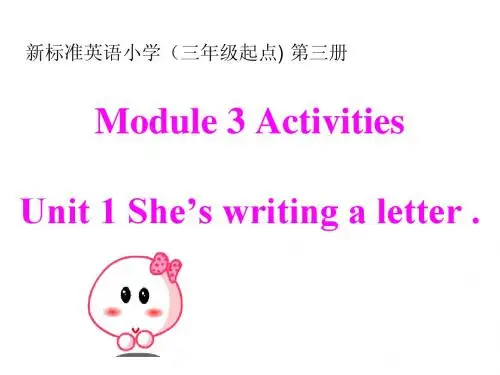
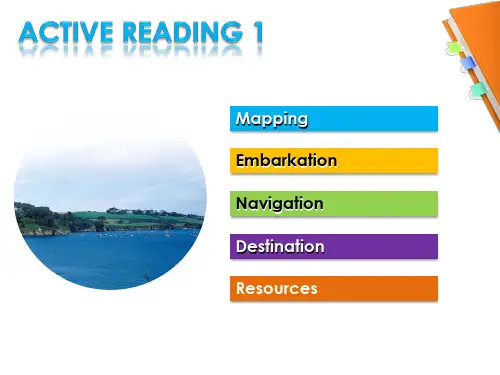
Module 1 Unit 1……seventeen,eighteen,nineteen,twenty! ……ten ,eleven ,twelve,look ,Weiwei.Here’s a red one……Thirteen…………and a green one .Fourteen……This is a blue one……Fifteen…………and this is a yellow one . Sixteen……Here’s a purple one……Seventeen…………and a pink one . Eighteen……A white one ……Ninteen …………and an orange one ! Twenty !Hooray !Oh,no ! Look . Hahaha !Unit 2 I’ve got twenty-six points .Have you got an elephant ? Yes ,I have .Have you got a tiger ?No , I haven’t .Have you got a lion? Y es ,I have .I’ve got twenty-two points .I’ve got twenty-six points . I’m the winner .Module 2 Unit 1 Go straight on .Look , Sam .This dog is lost .My name is Doudou .I live in No.2 , West Lake Road . Excuse me .Where’s No.2,West Lake Road ,please ?Turn left .Go straight on .Turn right .It’s next to a supermarket .Thank you .Byebye .Goodbye .Thank you so much . Y ou’re welcome .Unit 2 It’s at the station .Where is Train 1 ?It’s up the hill .Where is Train 2 ? It’s dow n the hill .Where is Train 3 ? It’s near the houses.Where is Train 4? It’s at the station.Module 3 Unit 1 She’s writing a letter.[1]Look at these pictures .[2]This is my friend ,Lingling .She’s writing a letter.[3]This is my friend ,Da ming .He’s taking pictures .[4]This is my sister ,Amy .She’s talking to her friend .[5]This is my little brother,Tom .He’s playing with a toy train .Unit 2What are you doing ?[1]What are you doing ,children?[2]I’m listening to music![3]I’m watchi ng TV ![4]What’s Tom doing ? Oh,he’s reading a book !Ha,ha,ha……Module 4 Unit 1 What are they doing ?[1]Let’s get on the bus .We can see lots of interesting things . Okay .[2]Look at the people in the park .[3]What are they doing ?They’re doing taijiquan.[4]Look at the people on the lake .[5]What are they doing ? They’re rowing a dragon boat .[6]Look at the men under the tree .What are they doing ?They’re playing chess .[7]Look at these girls .What are they drinking ?[8]They’re drin king soybean milk ![9]I’m hungry . I’m hungry ,too .Let’s go !Module 5 Unit 1 Do you want some rice ?[1]Look ,Amy .Chinese fast food ![2]Do you want some rice ? No, thank you .[3]Look at this man .What is he doing ? He’s making noodles .[4]Do you want some noodles ? Y es ,please .[5]Mum .It’s nice . Y es !But chopsticks are difficult .[6]Have you got chopsticks in England ? No, we haven’t .[7]Have you got fast food in England ?[8]Yes ,we have .Unit 2 I’m making dumplings .[1]What are you doing ,Daming ?I’m making dumplings.[2]Do you want some ? Y es,please![3]What are you doing,Mum?I’m cooking vegetables .[4]Do you want some ? Y es ,please .I love vegetables . No,thank you .Module 6 Unit 1 Can you run fast ?[1]Amy ,can you run fast ? Y es ,I can.[2]Ahhh, I’m the winner .Y ou can’t run fast ![3]Daming ,can you jump high ? Y es, I can .[4]Look!I’m the winner . Y ou can’t jump high .Y es ,Sam can jump very high ![5]Can you jump far ,Sam? Y es ,I can . Can you ?[6]No,I can’t .Y ou’re the winner .[7]Can you ride fast ? Y es ,I can .[8]Whoops!No,I can’t !Unit 2 Y es ,I can .[1]Can you make a cake ,Sam? Y es ,I can ./ No, I can’t .[2]Can you play the flute,Amy? Y es ,I can ./ No, I can’t .[3]Can you wash clothes,Lingling? Y es ,I can ./ No, I can’t .[4]Can you draw a dragon,Daming? Y es ,I can ./ No, I can’t .Module 7 Unit 1 We’re going to go to Hainan.[1]It’s bedtime,children . We’re going to go to Hainan tomorrow .[2]We’re going to go by plane! And we’re going to get up at 5 o’clock![3]Hello.What’s your name ? I’m Sam .I’m from England .[4]I’m Xiaoyong. I’m from China .[5]We’re going to go to Hainan. I’m going to swim in the sea.I’m going to visit my grandpa .And I’m going to swim ,too.[6]I’m going to swim now![7]Oh no!This is Xiaoyong’s bag! And Xiaoyong’s swimsuit !Unit 2 We’re going to visit the Ming Tombs .[1]We’re going to visit the Ming Tombs tomorrow . Hooray!( The next day )[2]Look!Stone animals. Lions,camels and elephants .[3]Roar! And scary animals ,too.What’s that ?It’s a monster .Help![4]Roar! Ha,ha,ha!Module 8 Unit 1 What are you going to do ?[1]We’re going to have a Sports Day.[2]What are you going to do for Sports Day?I’m going to run the 100 metres .[3]I’m going to run every day .[4]Where are you going ,Daming? I’m going to run in the park . (Sports Day)[5] Goodbye ,Daming!Good luck! Thank you ! Bye-bye .[6]Come on ,Daming.Run!Run!Y es! I’m the winner !I’m the winner !Unit 2 I’m going to do the high jump.What are you going to do for Sports Day?I’m going to do the high jump.I’m going to do the long jump.I’m going to run the 200 metres .I’m going to run the 100 metres .Module 9 Unit 1 Can I have some sweets ?[1]Mum, I’m hungry .Can I have some soup? Sorry,you can’t .[2]But I’m hungry .Can I have some sweets ,please? Sorry ,you can’t .[3]Can I have some bread ? Sorry ,you can’t .But Mum ,I'm VERY HUNGRY![4]e her e ,Amy. Mum ,I can’t see . It’s very dark .Well ,turn on the light .[5]Happy birthday,Amy! Thank you .[6]Now you can have some biscuits ,some fruit and some cake .Happy birthday to you …… Thank you ,Mum.Unit 2 Happy Halloween![1]Today is Halloween![2]Hello! Can I come in ? Oh!Hello! Y es ,of course.[3]Can I have some sweets ? Here you are .[4]Thank you !Whoops ! Happy Halloween ,Tom!Module 10 Unit 1 There is one birthday in May.[1]What are you doing ,Li ngling ? I’m counting my friends’ birthdays .[2]January.There are three .February .There are six .March .There is one .April . There are two .May . There is one .June . there are four …..[3]How many birthdays are there ? There are thirty-five .[4]I’m going to go to thirty-five birthday parties this year!So you’re very happy! Y es ,I am !Unit 2 There are twelve months in the year.There are five birthdays in July.August one; September two; October three; November six; December one。
第06册M01-4 a bit 有一点第02册M08-75 about 关于第11册M05-25 address 地址第06册M09-69 after 在…之后第01册M02-13 afternoon 下午第05册M10-63 airport 飞机场第11册M03-14 album 集邮册第05册M05-33 all 全部的第03册M04-36 all right 好吧第07册M01-6 also 也第06册M01-2 always 总是第10册M06-28 amazing 令人惊讶的第08册M08-58 America 美国第11册M03-16 America 美国第07册M01-7 American 美国人第01册M06-49 and 和第07册M06-40 angry 生气的第12册M02-15 angry 生气的,愤怒的第05册M08-48 animal 动物第10册M07-31 another 另一个第11册M06-32 answer 回答第08册M01-5 anything 任何东西第12册M02-7 aound 在…周围第06册M05-29 apple 苹果第07册M01-4 April 四月第04册M08-70 around 朝着相反方向第12册M05-27 arrive 到达第03册M03-27 Art 美术第03册M02-11 at 在第08册M07-54 at all 根本第07册M05-24 ate--eat 吃第08册M09-64 Australia 澳大利亚第03册M09-75 autumn 秋天第11册M07-38 awake 醒的第07册M06-42 away 离开第12册M04-23 away 在远处,到远处第02册M05-48 baby 幼崽第08册M09-68 back 后面的第10册M05-19 back 背部第02册M03-24 bag 包第01册M10-81 balloon 气球第11册M07-35 bamboo 竹子第08册M07-53 banana 香蕉第12册M09-41 baseball 棒球第02册M07-64 basketbal 篮球第01册M04-33 basketball 篮球第01册M10-83 bear 熊第06册M07-53 beautiful 漂亮的第08册M09-65 because 因为第01册M10-80 bed 床第08册M04-33 before 在…之前第09册M01-2 before 以前第07册M04-20 bicycle 自行车第02册M05-50 big 大的第03册M01-3 bike 自行车第01册M02-9 bird 鸟第02册M01-10 bird 鸟第01册M09-72 birthday 生日第05册M05-31 biscuit 饼干第01册M04-27 black 黑第09册M07-28 blind 盲的第12册M08-38 blind 瞎的第01册M04-28 blue 蓝第01册M07-58 book 书第11册M08-41 bookshelf 书架第08册M03-22 bored 无聊的第09册M09-39 bored 无聊的第10册M03-11 borrow 借入,借来第09册M05-19 both (两者)都第07册M05-26 bought--buy 买第01册M08-67 box 盒子第01册M02-11 boy 男孩第07册M07-44 break 弄坏第09册M08-37 break 休息第11册M10-48 bring 拿来,带来第10册M05-17 broken 损坏的,折断的第02册M02-17 brother 兄弟第10册M05-21 brown 棕色的;褐色第10册M06-25 build 建造第10册M10-48 building 建筑物第11册M01-6 building 建筑物,大楼第02册M03-31 bus 公共汽车第05册M09-61 bus driver 公交车司机第10册M07-33 busy 忙碌的第06册M01-3 but 但是第03册M08-62 by 乘坐第05册M02-12 cake 蛋糕第07册M07-48 came--come 来第04册M02-12 camera 照相机第05册M04-24 can 能第08册M08-61 Canada 加拿大第11册M03-17 Canada 加拿大第08册M08-60 capital 首都第02册M10-85 car 小汽车第04册M03-24 card 卡片第05册M06-35 careful 小心的第10册M05-18 carry 提,背,抱第12册M04-17 carry (用手、肩等)提,搬第01册M06-52 cat 猫第04册M05-40 catch 抓第08册M04-31 CD 激光唱盘第11册M07-34 CD-ROM 电脑光盘第12册M01-5 cent 美分第08册M02-14 cheap 便宜的第02册M05-44 chicken 鸡第11册M07-37 child 孩子第02册M09-80 children 孩子们第04册M07-51 Children's Day 儿童节第03册M08-67 China 中国第03册M03-26 Chinese 汉语,语文第08册M04-30 chinese 中国的第05册M01-9 chips 薯条第10册M04-15 chocolate 巧克力糖第08册M02-11 choose 选择第11册M08-42 choose 选择第05册M01-2 chopsticks 筷子第11册M06-29 chopsticks (复)筷子第03册M10-83 Christmas 圣诞节第10册M06-24 circle 圆,圆圈第03册M07-60 city 城市第11册M06-31 city 城市第08册M04-35 clap 鼓掌第12册M05-26 clap 鼓掌第04册M07-56 class 班级第01册M06-47 classroom 教室第07册M02-9 clean 打扫第05册M07-44 clever 聪明的第10册M07-32 click on 发出咔嗒声;点击第07册M05-27 climb 爬第06册M02-17 clock 钟第03册M02-13 clothes 衣服第02册M03-26 coat 外套第11册M03-18 coconut 椰子第12册M01-3 cola 可乐第03册M09-79 cold 寒冷的第05册M07-45 cold 感冒第11册M03-15 collect 收集第01册M04-32 colour 颜色第04册M02-18 colour 把…涂颜色第03册M06-51 come 来第04册M01-6 come on 快,走吧第05册M06-34 computer game 电子游戏机第08册M04-29 concert 音乐会第04册M06-49 cook 烧菜第03册M09-78 cool 凉爽的第11册M07-36 copy 模仿第08册M02-15 cost 价值为第05册M07-46 cough 咳嗽第08册M08-57 country 国家第09册M02-8 country 国家第04册M10-81 cousin 堂兄第08册M08-59 cousin 堂兄弟第02册M05-41 cow 奶牛第01册M07-62 crayon 彩笔第07册M07-45 cry 哭第07册M07-52 cup 奖杯第07册M07-62 cut--cut 切,割第02册M06-59 cute 可爱的第03册M02-7 dad 爸爸第02册M07-69 dance 跳舞第07册M01-5 dancing 舞蹈第11册M02-11 dancing 舞蹈第06册M09-67 day 天,日子第12册M08-39 deaf 聋的第06册M07-54 dear 亲爱的第10册M02-9 delicious 美味的第01册M06-48 desk 桌子第06册M10-75 different 不同的第11册M02-10 different 不同的第08册M02-10 difficult 困难的第11册M06-30 difficult 困难的第03册M04-34 dinner 正餐,主餐第07册M03-13 dirty 脏的第04册M03-21 do 做第02册M02-19 doctor 医生第01册M06-53 dog 狗第01册M10-82 doll 娃娃第12册M01-4 dollar 美元第01册M05-38 door 门第01册M05-41 down 向下第04册M08-64 down 向下第05册M03-17 dragon boat 龙舟第04册M07-57 dragon dance 舞龙第04册M02-14 draw 画第02册M03-29 dress 连衣裙第10册M08-35 drew (draw的过去式)画第04册M04-28 drink 喝,饮第02册M03-30 driver 司机第10册M01-1 drove (drive的过去式)驾驶第12册M02-10 dry 干的第08册M01-7 duck 鸭子第09册M01-3 duck 鸭子第12册M02-8 duck 鸭子第02册M04-36 ear 耳朵第08册M08-55 east 东方第04册M09-77 East Lake Road 湖东路第05册M01-7 easy 容易的第03册M10-81 eat 吃第02册M05-45 egg 鸡蛋第01册M03-21 eight 八第06册M05-38 eighteen 十八第06册M10-78 eighty 八十第05册M08-49 elephant 大象第02册M01-2 eleven 十一第10册M02-6 email 电子邮件第08册M04-34 end 结束第03册M10-84 England 英国第03册M03-18 English 英语第12册M01-6 enjoy 享受,欣赏第01册M07-61 eraser 橡皮第08册M03-24 everyone 每个人第11册M02-8 everywhere 各处,到处第12册M07-34 excited 激动的,兴奋的第04册M09-76 excuse me 对不起,打扰第08册M02-12 expensive 昂贵的第02册M04-37 eye 眼睛第02册M04-33 face 脸第04册M09-78 factory 工厂第12册M04-21 fall 落下,跌落第07册M05-35 fall over 摔倒第08册M06-45 fantastic 极好的第05册M04-27 far 远第02册M05-42 farm 农场第06册M06-47 fast 很快地第05册M01-10 fast food 快餐第02册M05-47 fat 胖的第02册M02-12 father 父亲第02册M08-73 favourite 特别喜爱的第05册M03-20 feed 喂第07册M07-60 fell off--fall off 从…跌落第07册M05-31 fell over--fall over 摔倒第07册M07-67 fever 发烧第08册M03-25 field 田地,牧场第06册M05-35 fifteen 十五第06册M10-73 fifty 五十第03册M04-29 film 电影第06册M08-59 find 找到第10册M04-12 fine (身体)很好第07册M07-63 finger 手指第07册M02-10 finish 完成第11册M06-33 finish 完成,结束第09册M07-31 fire 火第06册M08-60 first 第一第01册M03-18 five 五第05册M06-36 fix 修理第06册M08-58 floor 楼层第04册M03-25 flower 花第10册M01-2 flute 笛子第04册M07-59 fly 放(风筝)第07册M06-37 food 食物第02册M07-62 football 足球第01册M09-71 for 为第11册M05-28 foreign 外国的第05册M01-6 fork 叉第06册M10-77 forty 四十第01册M03-17 four 四第06册M05-32 fourteen 十四第01册M08-64 fox 狐狸第05册M07-43 Friday 星期五第02册M02-18 friend 朋友第06册M02-15 from 来自第06册M05-28 fruit 水果第06册M07-56 fun 有趣的第12册M02-12 funny 有趣的,好笑的第06册M04-26 future 将来第04册M04-31 game 游戏第12册M10-48 geography 地理第10册M04-14 get 收到,接到第05册M03-21 get out 离开第03册M05-38 get up 起床第01册M02-12 girl 女孩第08册M01-4 glasses 眼镜第03册M05-41 go home 回家第04册M06-50 go shopping 去购物第04册M09-73 go straight on 直着走第02册M07-68 go swimming 去游泳第03册M05-43 go to bed 上床睡觉第03册M05-39 go to school 上学第03册M08-64 go to work 上班第07册M06-36 gold 金子第07册M07-51 gold 金制的第01册M02-4 good 好的第06册M06-44 good at 擅长第01册M01-2 goodbye 再见第08册M10-72 granddad 祖父第02册M02-15 grandma 奶奶,外婆第02册M02-14 grandpa 爷爷,外公第06册M07-50 grandparent 祖父母第08册M01-8 grass 草地第03册M04-37 great 太好了第01册M04-26 green 绿第07册M05-25 had--have 享受第03册M10-82 hair 头发第03册M05-44 half 半小时第05册M01-8 hamburger 汉堡包第10册M05-22 hand 手第07册M07-55 happen 发生第08册M05-38 happen 发生第01册M09-70 happy 高兴的第05册M01-3 hard 困难的第06册M06-41 hard 努力地第01册M10-77 hat 帽子第03册M03-17 have 有第03册M05-47 have breakfast 吃早餐第03册M05-40 have lunch 吃午餐第02册M04-32 head 头第05册M07-40 headache 头疼第09册M07-30 hear 听见第11册M04-20 hear 听到,听见第09册M02-5 heavy 重的第12册M04-25 heavy 重的第01册M01-1 hello 你好第04册M06-43 help 帮助第06册M01-8 helpful 有帮助的第02册M03-23 her 她的第04册M06-48 her 她(宾格)第04册M01-7 here 在这里第02册M10-82 here's=here is 这是第09册M05-17 hers 她的第02册M02-21 he's=he is 他是第04册M05-37 hide 隐藏第06册M02-18 high 高的第05册M09-56 high jump 跳高第04册M08-62 hill 小山第04册M06-47 him 他(宾格)第02册M03-25 his 他的第09册M05-18 his 他的第10册M09-44 history 历史第12册M04-20 hold 拿着第04册M03-22 homework 家庭作业第05册M10-62 Hong Kong 香港第10册M06-27 hope 希望第05册M08-50 horse 马第04册M08-66 hospital 医院第02册M07-66 hot 热的第12册M01-1 hot dog 热狗第01册M08-66 house 房子第03册M08-61 how 怎样,如何第02册M01-1 how many 多少第01册M09-68 how old 几岁第06册M10-81 hundred 百第03册M04-33 hungry 饥饿的第04册M05-39 hurry up 赶快第07册M05-32 hurt 受伤第02册M09-81 ice cream 冰激凌第07册M05-30 ice-skating 滑冰第05册M02-13 idea 主意第04册M06-46 ill 生病的第05册M05-30 ill 生病的第01册M01-3 I'm=I am 我是第07册M04-17 important 重要的第01册M10-76 in 在…里第04册M10-80 in front of 在…的前面第09册M07-32 inside 在…里面第05册M02-14 instead 代替第12册M06-30 interested 感兴趣的第08册M03-28 into 到…里第07册M04-15 invent 发明第09册M04-13 invitation 请柬第04册M06-44 it 它(宾格)第01册M05-42 it's=it is 它是第03册M09-73 jacket 夹克第03册M01-2 jigsaw 拼图第05册M06-37 jigsaw puzzle 拼图玩具第05册M04-26 jump 跳第11册M09-46 kangaroo 袋鼠第11册M01-2 kilometre 公里第09册Ml0-44 kind 友善的第01册M08-65 kite 风筝第07册M07-61 knee 膝盖第05册M01-5 knife 刀第02册M01-5 know 知道第05册M03-19 lake 湖第08册M09-67 language 语言第06册M08-62 last 上一个第07册M07-49 last 刚过去的第03册M05-46 late 迟的第12册M04-22 later 稍后,随后第08册M03-26 laugh 笑第09册M05-22 laugh 笑第07册M03-12 learn 学习第07册M05-33 learnt--learn 学习第10册M10-47 leave 离开,动身第08册M09-69 leaves 树叶(复数)第04册M09-72 left 向左第02册M04-39 leg 腿第02册M01-11 let's 让我们第04册M02-17 letter 信第08册M03-27 lie 谎话,谎言第09册M02-6 lift 提,抬第02册M07-63 like 喜欢第04册M01-2 like 像,如同第09册M08-34 line 排列第11册M10-50 line 排,列第02册M06-58 lion 狮子第03册M06-54 listen 听第02册M05-49 little 小的第03册M07-59 live 居住第06册M02-14 London 伦敦第02册M06-53 long 长的第05册M09-54 long jump 跳远第01册M08-63 look 看第08册M03-20 look after 照看第06册M03-23 lots of 很多第06册M01-7 loud 吵闹的第03册M08-69 love 爱第05册M02-15 lovely 可爱的第08册M01-1 machine 机器第07册M06-39 made--make 制作第05册M02-11 make 制作第05册M08-52 man 男人第02册M01-9 many 许多的第08册M09-66 map 地图第03册M03-20 Maths 数学第07册M07-64 matter 麻烦事第12册M09-40 matter 麻烦事第06册M03-21 maybe 也许第04册M05-36 me 我(宾格)第02册M09-76 meat 肉第07册M07-65 medicine 药第08册M06-46 meet 见面,集合第10册M09-41 men (man的复数形式)男人第08册M05-41 message 消息,祝词第10册M07-30 message 信息第12册M10-45 middle school 中学第11册M01-3 might 可能,可以第06册M08-63 milk 牛奶第11册M01-4 million 百万,百万个第09册M05-15 mine 我的第09册M08-36 miss 想念第12册M09-43 mistake 错误第12册M06-32 model 模型第06册M09-68 Monday 星期一第07册M07-46 monster 怪物第08册M07-51 moon 月亮第06册M01-11 more 更多的第01册M02-5 morning 早晨,上午第09册M08-35 morning exercise (复)早操第02册M02-13 mother 母亲第08册M05-39 Mother's Day 母亲节第07册M05-28 mountain 山第05册M06-39 mouse 老鼠第02册M04-35 mouth 嘴巴第01册M05-39 Ms 女士第08册M10-74 much 许多的,非常第03册M02-6 mum 妈妈第03册M03-21 Music 音乐第01册M02-7 my 我的第01册M02-8 name 名字第07册M03-14 National Day 国庆节第05册M03-16 naughty 淘气的第12册M02-11 naughty 顽皮的,淘气的第11册M04-21 nearly 几乎,接近,差不多第08册M04-32 nervous 紧张的第03册M03-19 new 新来的第06册M02-19 new 新的第03册M10-80 New Year 新年第04册M02-11 newspaper 报纸第04册M10-79 next to 在…旁边第06册M01-1 nice 友善的第08册M07-52 night 夜晚第09册M03-11 night 夜晚第01册M03-22 nine 九第06册M05-39 nineteen 十九第06册M10-79 ninety 九十第01册M03-25 no 不是第04册M05-35 no one 没有人第04册M04-27 noise 噪音第02册M09-77 noodles 面条第08册M08-62 north 北方第02册M04-34 nose 鼻子第09册M09-40 nothing 没什么第03册M04-35 now 现在第02册M03-28 nurse 护士第03册M04-28 o'clock 点钟第04册M10-84 of course 当然第10册M08-34 of course 当然第10册M01-4 office 办公室第11册M08-40 often 常常,经常第03册M06-53 OK 好第06册M02-13 old 古老的第06册M07-51 old 老的第01册M10-78 on 在…上第03册M08-65 on holiday 度假第08册M03-19 once upon a time 从前第01册M03-14 one 一第07册M06-41 only 只第01册M05-36 open 打开第02册M01-4 orange 橙色第06册M05-30 orange 橘子第02册M01-6 other 其他的第01册M06-46 our 我们的第01册M02-10 panda 熊猫第07册M04-16 paper 纸第10册M08-37 paper 纸第10册M01-5 parent 父亲;母亲第03册M07-55 park 公园第03册M02-12 party 聚会第12册M04-19 party 聚会第03册M05-45 past 晚于第04册M08-65 past 经过第03册M03-24 PE 体育课第11册M09-44 peace 和平第06册M05-31 peach 桃子第01册M07-56 pen 钢笔第11册M05-26 pen pal 笔友第01册M07-59 pencil 铅笔第01册M07-60 pencil-box 铅笔盒第05册M01-4 people 人们第08册M02-13 perfect 完美的第05册M06-38 pet 宠物第06册M03-24 phone 打电话第04册M02-10 photo 照片第04册M07-58 picnic 野餐第04册M02-15 picture 图画第10册M08-36 piece 张、片、块第02册M05-43 pig 猪第02册M07-65 ping-pong 乒乓球第02册M05-51 pink 粉红的第10册M06-23 place 地方第11册M01-5 place 地方,地点第03册M08-68 plane 飞机第08册M07-49 planet 行星第02册M07-61 play 玩第03册M03-23 play 演奏第04册M07-52 play 剧第10册M01-3 player 演奏者第09册M01-4 playground 操场第04册M05-33 playtime 游戏时间第03册M03-22 please 请第11册M05-24 pleased 高兴的,满足的第06册M01-9 plus 加上第04册M07-55 poem 诗第01册M05-43 point 指,指向第09册M06-25 point 分第06册M04-27 policeman 警察第08册M10-71 postcard 明信片第08册M01-3 potato 土豆第07册M07-53 practice 练习第02册M10-83 present 礼物第11册M04-22 present 礼物第11册M05-27 pretty 漂亮的第07册M04-19 print 印刷第07册M04-18 printing 印刷术第08册M04-36 proud 自豪的第12册M07-36 proud 自豪的第02册M02-20 pupil 学生第07册M07-56 put--put 放第10册M09-40 question 问题在于第12册M02-13 quickly 很快地第06册M01-6 quiet 安静的第06册M06-43 quite 相当地第05册M09-57 race 赛跑第04册M02-9 radio 收音机第04册M01-5 rain 下雨第07册M07-47 ran--run 跑第03册M06-50 read 读第12册M10-46 really 真正地第01册M04-30 red 红色第09册M04-14 reply 回复第08册M06-43 report 报导第08册M10-73 restaurant 餐馆第09册M02-10 restaurant 饭馆第11册M02-9 restaurant 饭馆第10册M03-10 return 归还第02册M09-78 rice 米饭第07册M07-57 ride 骑第04册M09-74 right 向右第08册M07-50 ring 环,环形物第06册M02-16 river 河流第04册M03-20 room 房间第10册M09-43 room 房间第06册M02-20 round 圆的第05册M03-18 row 划船第09册Ml0-43 rule 规则第01册M07-57 ruler 尺子第03册M04-31 run 跑第05册M09-58 run a race 参加赛跑第04册M05-34 sad 伤心的第09册M07-33 safe 安全的第07册M06-43 said--say 说第10册M02-8 sandwich 三明治第05册M10-65 Saturday 星期六第10册M02-7 sausage 香肠第07册M05-23 saw--see 看见第04册M07-54 say 念,背诵第06册M06-45 say 表达,写道第12册M09-44 scared 恐惧的第02册M06-60 scary 可怕的第01册M07-55 school bag 书包第03册M03-25 Science 科学第10册M08-38 scissors 剪刀(复数)第05册M10-64 sea 大海第10册M04-16 season 季节第01册M06-50 seat 座位第06册M08-57 second 第二第04册M03-23 secret 秘密第04册M08-68 see 看见第05册M04-28 see 看出,发觉第04册M05-38 seek 寻找第09册M02-7 sell 卖出价第08册M10-70 send 寄第10册M04-13 sent (send的过去式)寄第01册M03-20 seven 七第06册M05-37 seventeen 十七第06册M10-80 seventy 七十第08册M03-21 sheep 绵羊第02册M02-22 she's=she is 她是第12册M02-16 shine 发光第03册M08-66 ship 船第03册M02-10 shirt 衬衫第03册M02-15 shoe 鞋第05册M05-29 shop 商店第02册M06-55 short 短的第05册M03-23 shorts 短裤第09册Ml0-42 should 应该第10册M05-20 shoulder 肩膀;肩部第08册M03-17 shout 呼喊第06册M01-5 shy 害羞的第08册M01-9 silence 安静第03册M10-85 sing 唱第08册M01-2 sir 先生第02册M02-16 sister 姐妹第01册M05-40 sit 坐下第01册M03-19 six 六第06册M05-36 sixteen 十六第06册M10-76 sixty 六十第07册M05-34 skate 滑冰第04册M05-32 skip 跳绳第09册M05-21 skirt 短裙第04册M07-60 sleep 睡第03册M02-9 small 小的第04册M02-13 smile 微笑第02册M06-52 snake 蛇第04册M01-8 snow 下雪第02册M01-8 so 如此第10册M06-26 solve 解答,解释第04册M07-53 some 一些第12册M07-37 someday 将来某一天第09册M02-9 sometimes 有时第03册M01-1 song 歌曲第07册M01-1 soon 不久第12册M02-9 soon 不久,快第02册M10-84 sorry 对不起的第08册M08-63 south 南方第08册M07-47 space 太空第12册M06-28 space 太空第12册M06-31 spaceship 宇宙飞船第06册M06-42 speak 说话第08册M05-42 special 特殊的第09册M07-29 special 特别的第11册M04-19 special 特殊的,特别的第12册M07-33 spend 度过第02册M08-74 sport 运动第05册M09-55 Sports Day 运动日第03册M09-71 spring 春天第12册M04-24 stairs (常复)楼梯第11册M03-13 stamp 邮票第01册M05-34 stand 起立第04册M08-63 station 车站第08册M06-44 stick 粘贴第07册M01-3 still 仍第05册M07-41 stomach ache 胃痛第05册M08-47 stone 石头第04册M08-67 stop 停止第12册M10-50 student 学生第09册M08-38 study 学习第12册M10-47 study 学习第03册M09-74 summer 夏天第08册M07-48 sun 太阳第04册M06-42 Sunday 星期天第04册M01-3 sunny 晴朗的第04册M10-82 supermarket 超市第12册M04-18 supermarket 超市第08册M05-40 surprise 出乎意料的第11册M02-7 surprise 惊奇第03册M09-76 sweater 毛线衫第02册M09-79 sweets 糖果第02册M07-67 swimming 游泳第06册M09-65 take 带着第04册M04-29 talk 谈话第02册M06-56 tall 高的第05册M09-60 taxi driver 出租车司机第01册M06-51 teacher 老师第09册M06-26 team 队第12册M09-42 team 队第07册M01-2 tell 告诉第01册M03-23 ten 十第05册M07-42 test 考试第01册M09-73 thank 谢谢第01册M06-54 that 那个第07册M05-22 the Great Wall 长城第10册M09-39 theatre 剧院第02册M03-27 their 他们的第06册M05-33 them 他们(宾格)第03册M05-42 then 然后第06册M07-52 then 在那时第04册M04-30 there 在那里第02册M04-38 these 这些第02册M05-40 they're=they are 他们是第02册M05-46 thin 瘦的第04册M06-45 thing 东西第07册M07-58 thirsty 口渴的第11册M10-47 thirsty 口渴的第06册M05-34 thirteen 十三第06册M10-74 thirty 三十第09册M06-27 thirty--six 三十六第01册M06-45 this 这个第10册M06-29 thought (think的过去式)第08册M02-16 thousand 千第11册M01-1 thousand 一千,一千个第01册M03-16 three 三第06册M09-72 Thursday 星期四第10册M10-45 ticket 票第04册M03-19 tidy 整理,收拾第11册M08-39 tidy 整理,收拾第06册M03-22 tiger 老虎第03册M04-30 time 时间第02册M07-70 tired 疲劳的第01册M05-44 to 去,到,向第04册M03-26 today 今天第02册M08-72 together 一起第11册M04-23 together 一起第06册M09-64 tomorrow 明天第03册M02-8 too 太第03册M07-56 too 也第07册M06-38 took--take 拿走第07册M07-66 toothache 牙疼第10册M10-46 toothbrush 牙刷第04册M08-71 touch 触摸,接触第03册M01-4 toy 玩具第03册M04-32 train 火车第05册M09-59 train driver 火车司机第12册M06-29 travel 旅行第02册M01-7 tree 树第03册M02-14 trousers 裤子第09册M06-24 true 真实的第06册M06-46 try 努力,尝试第03册M02-5 T-shirt T 恤衫第06册M09-70 Tuesday 星期二第04册M08-69 turn 转向第02册M01-3 twelve 十二第06册M01-10 twenty 二十第01册M03-15 two 二第01册M10-79 under 在…下第01册M05-35 up 向上第04册M08-61 up 向上第03册M07-58 us 我们(宾格)第05册M01-1 use 使用第12册M10-49 useful 有用的第04册M06-41 usually 通常第06册M08-61 vegetable 蔬菜第02册M06-57 very 非常第12册M07-35 video 录像第08册M03-23 village 村庄第05册M08-51 visit 参观第08册M01-6 wait 等待第12册M01-2 waitress 女服务生第03册M08-63 walk 步行第03册M07-57 want 想要第03册M09-77 warm 暖和的第07册M02-11 wash 洗第03册M06-48 watch TV 看电视第09册M09-41 water 水第07册M07-59 watermelon 西瓜第11册M10-49 way 方式,方法第03册M03-16 we 我们第03册M09-72 wear 穿第04册M01-1 weather 天气,气候第06册M09-71 Wednesday 星期三第11册M08-43 week 星期,周第03册M06-49 weekend 周末第11册M02-12 weekend 周末第01册M09-74 welcome 欢迎第04册M10-83 well 详细地,熟悉地第09册M06-23 well 好的第07册M05-21 went--go 去第08册M08-56 west 西方第04册M09-75 West Lake Road 湖西路第05册M03-22 wet 湿的第12册M02-14 wet 湿的第01册M02-6 what's=what is 是什么第08册M04-37 when 什么时候第01册M10-75 where's=where is 在哪里第01册M04-29 white 白色的第06册M07-49 who 谁第09册M05-20 whose 谁的第06册M09-66 why 为什么第09册M03-12 why 为什么第06册M02-12 wide 宽的第07册M07-54 win 赢得第01册M05-37 window 窗户第04册M01-4 windy 有风的第05册M04-25 winner 胜利者第03册M09-70 winter 冬天第06册M04-25 witer 作家第02册M08-71 with 用第03册M06-52 with 和…一起第08册M03-18 wolf 狼第05册M08-53 woman 女人第10册M09-42 women (woman的复数形式)女人第07册M07-50 won--win 赢得第07册M05-29 wore--wear 穿第06册M06-40 work 工作,学习第11册M09-45 world 世界第05册M05-32 worry 担心第04册M02-16 write 写第09册M01-1 year 年第01册M04-31 yellow 黄色的第01册M03-24 yes 是第06册M07-55 yesterday 昨天第07册M02-8 yesterday 昨天第06册M07-48 young 年轻的第01册M09-69 you're=you are 你是第09册M05-16 yours 你(们)的第02册M06-54 zoo 动物园。
Language in useword formation: compound words1 Find more examples of each use of hyphens in the passage We are all dying .• I’ve double- and triple-checked it. (compound verb)• budding crypt-kickers (compound noun)• a rear-view mirror (compound adjective)• the once-a-year holiday to Florida or Spain (compound adjective)• back-burner stuff (compound adjective)• standing at the corner of the Co-op (compound noun)• a sepia-coloured relative that no one can put a name to (compound adjective)2 Rewrite the phrases using compound adjectives.1 a party which is held late at night (a late-night party)2 a library which is well stocked (a well-stocked library)3 a professor who is world famous (a world-famous professor)4 some advice which is well timed (some well-timed advice)5 a population which is growing rapidly (a rapidly-growing population)6 an economy which is based on free market (a free-market economy)7 a boat trip which lasts for half an hour (a half-hour boat trip)It’s what / how …that …3 Rewrite the sentences using It’s what / how …that …1 What other people think of us is determined by how we behave.It’s how we behave that determines what other people think of us.2 What sort of job we are going to end up doing is usually determined by our character.It’s what our character is that usually determines what sort of job we are going to end up doing.3 What we do as a career isn’t always determined by the marks we get at university.It isn’t always what marks we get at university that determine what we do as a career.4 How we react to life’s problems is often determined by our childhood experiences.It is often what we experienced in our childhood that determines how we react to life’s problems.5 When we die is determined by our genetic clock, and the changes we make to it.It’s what our genetic clock is and what changes we make to it that determine when we die.It is / was not just that …but …4 Rewrite the sentences using It is / was not just that …but …1 Not only were the shops all closed for Thanksgiving, there was also no one in the streets.It wasn’t just that the shops were all closed for Thanksgiving, but there was no one in the streets.2 Not only did she spend all her time at college going to parties, she also took the time to gain a first-class degree.It wasn’t just that she spent all her time at college going to parties, but she took the time to gain a first-class degree.3 Not only were they not listening to what he said, it also seemed as if they weren’t at all interested.It wa sn’t just that they weren’t listening to what he said, but it seemed as if they weren’t at all interested.4 Not only was I upset, I also felt as if I was going to burst out crying.It wasn’t just that I was upset, but I felt as if I was going to burst out crying.5 Not only was the Grim Reaper intended to frighten people, it was also a figure of fun.It wasn’t just that the Grim Reaper was intended to frighten people, but it was also a figure of fun. collocations5 Read the explanations of the words. Answer the questions.1 settle When you settle somewhere you go there to stay.(a) Where is dust likely to settle in a room?On the surfaces that aren’t used very often or aren’t cleaned.(b) If you settle an argument, is the conclusion satisfactory?Yes, it is, because the disagreement is solved and each party is satisfied with the outcome.(c) If you settle the bill, what is there left to pay?Nothing, because you have paid everything that is owed.(d) What do you do when you settle back to watch a film?We relax in a comfortable chair and enjoy it.2 smooth This word can mean flat or soft, comfortable, easy or confident.(a) If the sea is smooth, are you likely to feel seasick?No, because the sea is calm. We will feel seasick if it is rough.(b) If a changeover from one government to the next is smooth, are there lots of problems?No, because the changeover has gone well, without difficulties.(c) Is it a good idea to trust a smooth talker?Not necessarily, because some people who talk confidently like that do so to trick you, like a confidence trickster or conman.3 offer This word can refer to something you would like someone to take, something someone gives, or something that is for sale.(a) If you decline an offer, do you say “yes” or “no”?We say “no”, be cause we are refusing it.(b) If you offer an apology to someone for something you have done, what do you say?We should say, “I apologize” or “I’m sorry”.(c) Where are you likely to see special offer?In a shop, because the shop is offering a special price or reduction for something.(d) If someone has a lot to offer, what kind of person are they?They are intelligent, talented, gifted or creative and they will bring these kinds of qualities to their work.4 bear If you bear something you carry or bring it. If you cannot bear something, you dislike it or cannot accept it.(a) If you bear something in mind, do you forget it?No, we will remember it and consider it for a particular occasion in future.(b) If you bear a resemblance to someone, in what way are you like them?We look similar in certain physical features.(c) Is there anything you can’t bear to think about?I can’t bear to think too much about some of the problems in the world, famine, war, poverty etc. In the modern world, why don’t we just solv e them?5 resistance This word can refer to the refusal to accept something new, the ability not to be harmed by something, or opposition to someone or something.(a) If there is resistance to an idea, do people accept it?No, not easily. They refuse to ac cept the idea maybe because it’s just a bad idea, or they may change their mind if they understand it better.(b) If the soldiers met with resistance, what happened?The soldiers met opposition from those they were fighting against.(c) Is there a way to build up your resistance to cold?Yes, we can keep ourselves as healthy as possible with a good diet and getting enough exercise so that we are less likely to catch a cold, or if we do get one, we won’t suffer so badly.6 Translate the paragraphs into Chinese.1 We all sensed we were coming to the end of our stay here, that we would never get a chance like this again, and we became determined not to waste it. Most important of course were the final exams in April and May in the following year. No one wanted the humiliation of finishing last in class, so the peer group pressure to work hard was strong. Libraries which were once empty after five o’clock in the afternoon were standing room only until the early hours of the morning, and guys wore the bags under their eyes and their pale, sleepy faces with pride, like medals proving their diligence. (☞and guys wore the bags under their eyes and their pale, sleepy faces with pride … 这句的动词wear 后面带两个宾语,中文找不到能带这两个宾语的动词,故处理成四个中文短句;翻译like medals proving their diligence时,采用“增词法”增加“这些”来概括前面所描写的“眼袋”,“脸色苍白”,“睡眼惺忪”等,使译文含义更加清晰流畅。
新标准英语第三册导论《新标准英语第三册》是一本适用于中学生的英语教材,旨在帮助学生提高听说读写的能力,增强英语交流的能力。
该教材以全新的教学理念和方法设计,突破传统的教学模式,注重培养学生的实际应用能力和综合语言技能。
第一章:生活与交流第一章主要围绕日常生活和交流展开。
通过讲解常用的生活常识和表达方式,帮助学生建立起基本的交流能力。
教材中涵盖了日常购物、订餐、问路等生活场景,并提供了实用的对话模板和词汇表。
通过这样的学习,学生可以在实际生活中更加自如地应对各种交流场景。
第二章:学业与学习第二章着重介绍学业与学习方面的内容。
教材中收录了关于课业、学校生活和学习方法等知识点,并提供了相关的练习题和学习技巧。
此外,该章节还介绍了常用的学术词汇和表达方式,帮助学生更好地理解和阅读英语学术文献。
通过这一章的学习,学生可以提高自己的学习效率和学术英语能力。
第三章:文化与娱乐第三章主要介绍了英语国家的文化和娱乐活动。
教材中涵盖了音乐、电影、戏剧、体育等多个方面的内容,并提供了相关的阅读材料和练习题。
通过学习这一章,学生可以了解并掌握不同的文化表达方式,拓宽自己的文化视野。
第四章:职场与就业第四章主要围绕职场和就业展开。
教材中介绍了职场用语、求职技巧等内容,并提供了实用的面试对话模板和练习题。
通过学习这一章,学生可以了解职场的基本礼仪和沟通技巧,提高自己在职场中的竞争力。
第五章:社会与环境第五章主要介绍了社会和环境问题。
教材中涵盖了环保、社会问题、公益活动等内容,并提供了相关的阅读材料和写作题目。
通过学习这一章,学生可以了解和探讨一些全球性的社会和环境问题,并学会用英语表达自己的观点和意见。
总结《新标准英语第三册》是一本针对中学生设计的英语教材,以全新的理念和方法提升学生的英语水平和应用能力。
通过生活与交流、学业与学习、文化与娱乐、职场与就业、社会与环境等主题的内容,学生可以全面提升综合语言能力,并且在实际应用中更加自如地运用英语。
Carly英语教室新标注第三册期末复习
一.基本语法
(1)陈述句肯定及否定形式[do-don’t does-doesn’t (第三人称单数时选)]
I like the ABC song.
I don’t like the ABC song.
She like s the ABC song.
She doesn’t like the ABC song.
(2)一般疑问句
第一类:句子中有动词,所以选择do does来开头,别忘了按人称确定Does he play the flute?
Do you play the flute?
第二类:以必动词开头(注意必动词的选择)
Is she a girl ?
Are you a girl ?
(3)特殊疑问句
特殊疑问词:what什么 when什么时候 where在哪里 which哪一个how.怎么样特殊疑问句 = 特殊疑问词 + 一般疑问句
1.what do you like ?
2.where do you live ?
3.how do you go to school?
4.what do you do at the weekend?
5.what is the time?
6.what do you do at Chinese new year?
(4)单三(单数第三人称作主语时,后面的动词要变化,加s或 es)
She likes PE.
She watch es TV.
(5)名词复数(别忘了选择题中数量大于1,名词有尾巴。
必动词要用are)
(6)介词用法(本书中的介词有:on在..上面 in在..里面 under在..下面 at
by for to with)
I get up at 7 o’clock.(在几点钟前用at)
I go to school by bike.(to后加地点by后加交通工具)
He goes by bus with my mother.(表示和谁一起用with)
A present for you .(给你的礼物)
In the morning ,at night
(7)Be动词用法(看准人称及单复数,通过口诀选好必动词)
(8)时刻表达
1)整点表达数字 + o’clock it’s 7 o’clock.
2)半点表达 half past + 数字 it’s half past 7 。
表示7:30
二.固定短语(需背诵)(容易出选择)
Get up go to school
have lunch
go to bed
go home
have breakfast go to work
on holiday
in the afternoon at the weekend
read book
go swimming
play the flute(别忘乐器前加the) play football(球类前不加the)live in (后面加大地点)
三.考试注意
1 按照我的分类到书中看句子,注意细节。
2 后面单词表里的85个单词会写
3 考试时读题,抓关键词和你认识的词分析题意,再写答案 4只要把以上知识点都掌握并且会活用,就能创造奇迹。